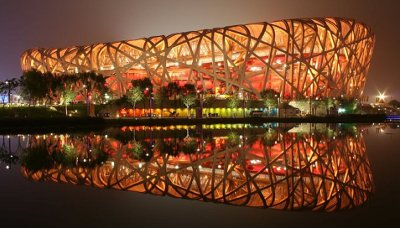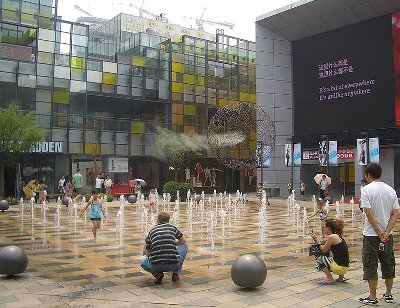3rd ICCS Manycore and Accelerator-based High-performance Scientific Computing
Workshop
National Astronomical Observatory/Chinese Academy of Sciences
Beijing, China
in conjunction with International Center for Computational Science and HPC Advisory Council
Tutorials March 26 – 27, 2012 (Tentative Program here soon)
Workshop March 28 – 30, 2012 (Tentative Program here soon)
Call for contributed talks and posters - Abstract Deadline (March 10, 2012), (Use Registration to submit an Abstract)
REGISTRATION IS CLOSED
National Astronomical Observatories of Chinese Academy of Sciences (NAOC), Silk Road Project announces the 3rd school and workshop of the International Center for Computational Sciences (ICCS), a joint venture between LBNL, CAS and the University of Heidelberg. NAOC is member of a special network operating GPU accelerated supercomputers for basic and applied sciences in China. The Silk Road Project aims to foster education and international collaboration in China, focused on computational astrophysics and physics. NAOC and Silk Road Project have close links with the Kavli Institute of Astronomy and Astrophysics at Peking University, one of the first fully international research institutes in China.
The workshop should bridge the gap between cutting edge new computing technologies and scientific application programmers and users. It should inspire and encourage faculty, staff and students alike to learn about tools and methods how to use such new facilities (such as multi- or many-core architectures, like e.g. GPU or FPGA) and it should be a forum for experts and students to exchange their knowledge and experience among different disciplines and between academia and industry. Holding our workshop at NAOC means that especially computational astrophysics and astrophysical data processing will be important issues, but at the same time a strong interdisciplinary program is our goal.
We think that many-core and accelerated computing is an importing stepping stone in hardware and software development towards Exaflop/s computing. ICCS as the patron of our series of schools and workshops (before in Stanford and Berkeley) is a collaboration founded by four institutions in US, China, Germany, Japan, who each provide considerable hardware and software resources and want to foster collaboration and the use of new facilities in their communities.
In these goals we aim to collaborate with the HPC Advisory Council, which works for similar goals on a larger international scale.
The 3rd ICCS School and Workshop will also be an excellent opportunity for Chinese students and researchers to meet and discuss with national and international experts of advanced supercomputing and to help further advancing Chinas role in scientific supercomputing - towards the Exaflop/s scale.
Our goals are summarised as:
- support and encourage international and interdisciplinary collaborations
- educational and training prospects for future researchers, educators and students, especially from China and Asia
- providing leadership for participating institutions and facilities in the cutting-edge technologies
- promote academia-industry partnerships
A tentative program will be available here in few days.
Deadline for contributed papers is March 10, 2012.
This meeting will be very informal and should go without any registration fee.
A small contribution for the conference dinner may be charged, more details later here.
Local and ICCS Organizers
Rainer Spurzem, Peter Berczik, Chenzhou Cui, Shuo Li, Changhua Li, Klaus Rieger (all NAOC), Hemant Shukla (LBNL)
Program Advisory Panel
Horst Simon (LBNL), Changbom Park (KIAS), Ge Wei (CAS), Ying Liu (CAS), Long Wang (CAS), Tong Liu (HPCAC), John Shalf (LBNL)
Preliminary Programme
School Programme Monday/Tuesday March 26-27
Morning March 26:
Hemant Shukla LBNL, CUDA for Beginners
Guillermo Marcus Heidelberg Univ., OpenCL for Starters, Programming Models for GPU/FPGA
Afternoon March 26:
Tsuyoshi Hamada (NACC, Japan): How to build a cost-efficient supercomputer?
Wen-mei Hwu (UIUC, USA): "Advanced GPU Programming for Science" Part 1
Morning March 27:
Wen-mei Hwu (UIUC, USA): "Advanced GPU Programming for Science" Part 2
Afternoon March 27:
All Lecturers and Rainer Spurzem: Hands-On Experiments
Scientific Workshop Programme March 28-30:
Invited Speakers (note full program including posters and contributed talks will be published after March 10).
Wen-Mei HWU, Univ. of Chicago-Illinois:
High Performance Parallel Computer Systems
Ying Liu, Graduate University of CAS, Beijing
Data mining algorithm acceleration by GPU
Changbom Park, KIAS, South Korea:
Horizon Run Cosmological N-body Simulations
Sonja Uphoff, Technical Univ. Braunschweig, Germany,
Lattice Boltzmann (LBM) simulation of complex flows using GPUs
Long Wang SCCAS Beijing:
SC_PEtot: a plane wave pseudopotential density functional theory code on GPU cluster (GPU clusters in material science)
Guangmin Tan, Institute of Compute Technology, CAS Beijing:
Single-particle 3D Reconstruction on Specialized Stream Architecture and Comparison with GPGPUs
Yunquan Zhang, Institue of Software, CAS
Optimizing SpMV for Diagonal Sparse Matrices on GPU
Yifeng Chen, Prof., Dept. of Electric Engineering and Computer Science Peking Univ.
GPU Programming Technologies with PARRAY
Hemant Shukla, LBNL, ISAAC and ICCS Projects
Infrastructure for Astrophysics Application Computing
Tong Liu, HPC Advisory Council, Director Asia
HPC development by HPC Advisory Council
Ge WEI, IPE/CAS Beijing, China:
Multi-Scale Physics Simulations on Large GPU Clusters
Felipe Cruz, Nagasaki Adv. Comp. Center Japan
(tbc)
Rainer SPURZEM, NAOC/CAS and Heidelberg University:
Direct N-Body for Astrophysics on GPU clusters in three continents
Mario SPERA, Univ. of Rome La Sapienza, Rome
John XIE, NVIDIA China: NVIDIA Roadmap
Venue
 The meeting will take place at the National Astronomical Observatories (NAOC) of Chinese Academy of Sciences (CAS),
The meeting will take place at the National Astronomical Observatories (NAOC) of Chinese Academy of Sciences (CAS),
situated in its Olympic Village Campus,near the famous "Birds Nest" (Beijing Olympic Stadion), see
http://english.nao.cas.cn and http://english.nao.cas.cn/Contact/Direction
Please find here a preliminary map:
http://silk0.bao.ac.cn/silkroad-save/naoc-location.pdf
Important Visa Information:
Entry to China requires a visa for most foreign participants.
Check here for Tourist L VISA information
Your Chinese visa (typically business/conference visa) will be issued by the Chinese Consulate nearest to your present permanent residence. To obtain it, you will receive an invitation by Chinese Academy of Sciences.
To prepare the invitation, please contact Mrs. Hazel Wei at NAOC : hazelwei<-at->nao.cas.cn , and please ALWAYS cc to spurzem<-at->bao.ac.cn
Accommodation
 Participants are encouraged to take care about their own travel and accommodation arrangements, unless we explicitly tell you otherwise. International hotel portals, such as expedia, or international travel agencies, can nowadays book hotel rooms in Beijing and China without any problem. We are happy to help in case of any questions or problems.
Participants are encouraged to take care about their own travel and accommodation arrangements, unless we explicitly tell you otherwise. International hotel portals, such as expedia, or international travel agencies, can nowadays book hotel rooms in Beijing and China without any problem. We are happy to help in case of any questions or problems.
Our region in Beijing is called "Chaoyang North", near the Olympic Stadium and Olympic Village, see e.g. in (www.expedia.com Hotel Search for Beijing); we recommend nearby business style hotels e.g. "Best Western Olympic Stadion", "Ramada Beijing North" or, for luxury class, "Pangu Seven Star".
A limited amount of rooms will be available for lower rates in the NAOC guesthouse, and in the "Green Tree Inn Olympic Stadium", for those with a tight budget in particular. These can only be booked through us ( Mrs. Hazel Wei hazelwei<-at->nao.cas.cn , please ALWAYS cc to spurzem<-at->bao.ac.cn ).
Also a limited financial support for accommodation will be available on request.



